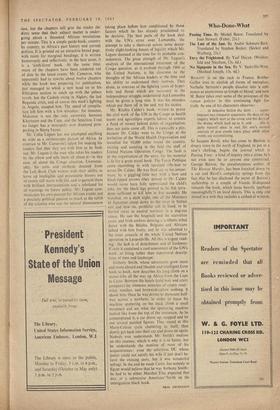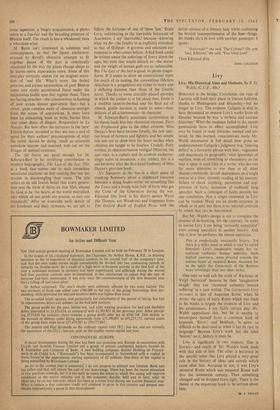Who-Done-What
No Signposts in the Sea. By V. Sackville-West. (Michael Joseph, 13s. 6d.)
'REALITY' is on the rack in France. Robbe- Grillet tries to abolish all forms of metaphor, Nathalie Sarraute's people dissolve into 'a sub- stance as anonymous as lymph or blood,' and now M. Butor takes over some of the processes of the roman policier in this continuing fight for truth. As one of his characters observes: . . . in detective fiction the story . . . super- imposes two temporal sequences, the days of the enquiry which start at the crime and the day s of the drama which lead up to it. and . . . this is quite natural since in real life one's mental • analysis of past events takes place while other events are accumulating.
So Jacques Revel, who has come to Bleston, a dreary town in the north of England, to put in a year's clerking, begins the journal which is Passing Time: a kind of inquiry into a crime he's not even sure he or anyone else committed. George Burton, the pseudonymous author of The Blesion Murder, has been knocked down by a car and Revel's complicity springs from the fact that he has disclosed the secret of Burton's authorship to a couple of friends ill-disposed towards the book, which leans heavily (perhaps meaningfully?) on local decors. This is only one strand in a web that includes a cathedral window,
some tapestries, a Negro acquaintance, a photo taken at a fun-fair and the brooding presence of Bleston itself. The result is less a whodunnit than a who-done-what.
M. Butor isn't interested in solutions and comeuppances, so that the jigsaw excitement aroused by Revel's obsessive attempts to fit together pieces of the past is continually chastened by the way the pieces change shape as he learns more, experiences more. Some of this interplay certainly makes for an original sensa- tion of 'real life.' What's more, the boiled potatoes and joyless amusements of poor Bleston come into nicely accentuated focus under the incredulous Gallic eyes that register them. There are boring stretches—the conscientious re-hashing of past scraps almost guarantees that—but a clever, quite complex study of obsession emerges from the scrum of annotations. It must have been an exhausting book to write, harder than that other diary of disgust, Roquentin's in La Nausee. But how often the narrators in the 'new' French fiction, moulded as they are into a sort of spout for their authors' preconceptions of what the novel should be doing, result as creatures somehow narrow and maimed, well out on the fringes of normal existence.
The old forms are good enough for M. Schwarz-Bart in his terrifying contribution to modern hagiography, The Last of the Just. This is a book that moves one to such immediate emotional reactions on first reading that one has trouble in disentangling their cause. The title refers to an old Jewish belief that every genera- tion sees the birth of thirty-six Just Men, elected by God, to be 'the hearts of the world multiplied, into which all our griefs are poured, as into one receptacle.' After an ironically swift sketch of his forebears and their torments, we are left to follow the fortunes of one of these 'just,' Ernie Levy, culminating in the inevitable holocaust of Auschwitz. say 'inevitable,' because—knowing what we do—the fatality is as explicitly attendant as that of (Edipus: it governs and animates our response to what comes before. A bad book could be written about the sufferings of Jewry down the ages, but even that would disturb us—the matter and the weight, of human guilt are so unbearable. But The Last of the Just is good; in places magni- ficent. If it seems to draw on conventional types for much of its casting, the conventions (Sholem Aleichem is a progenitor) are richer in irony and a deflating humour than those of the Gentile novel. Thanks to some crucially placed episodes in which the author is at his sharp best, Ernie is a credible saint-in-the-bud and his final act of absurd, gentle heroism is made to seem—most delicate of all achievements—in character.
M. Schwarz-Bart's passionate involvement in his theme leads him into rhetorical excesses. Envy the Frightened goes to the other extreme. Miss Dayan's Jews have become Israelis, the new spar- tan breed of farmers and fighters, and her simple tale sets out to show how the heart ossifies when children are taught to be fearless. Crudely, flatly written, its characterisation vestigial (Nimrod, the new man, is a cipher) and its symbols embarras- singly naïve (a mountain, a toy rabbit), this is a sad let-down after the first-hand freshness of Miss Dayan's previous book.
No Signposts in the Sea is a short piece of creaking flummery about a shipboard romance between a dying leader-writer on something like the Times and a lovely wise lady of-forty who got the Cross of the Liberation during the war. Edmund (the book is his diary) quotes Wyatt (Sir Thomas, not Woodrow) and fragments from The Oxford Book of English Prose with the lavish aptness of a literary lady while confessing his brutish incomprehension of the finer things. He thinks she's in love with another passenger. I quote:
'Dalryrnple?' she said. 'The Colonel? Oh, you fool, Edmund,' she said. 'You blind fool!'
Then Edmund dies. JOHN COLEMAN











































 Previous page
Previous page